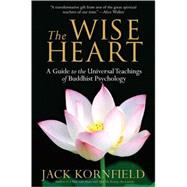
Note: Supplemental materials are not guaranteed with Rental or Used book purchases.
Purchase Benefits
What is included with this book?
| Introduction | p. 1 |
| Who Are You Really? | |
| Nobility: Our Original Goodness | p. 11 |
| Holding the World in Kindness: A Psychology of Compassion | p. 22 |
| Who Looks in the Mirror? The Nature of Consciousness | p. 35 |
| The Colorings of Consciousness | p. 48 |
| The Mysterious Illusion of Self | p. 61 |
| From the Universal to the Personal: A Psychology of Paradox | p. 79 |
| Mindfulness: The Great Medicine | |
| The Liberating Power of Mindfulness | p. 95 |
| This Precious Human Body | p. 110 |
| The River of Feelings | p. 124 |
| The Storytelling Mind | p. 137 |
| The Ancient Unconscious | p. 150 |
| Transforming The Roots Of Suffering | |
| Buddhist Personality Types | p. 167 |
| The Transformation of Desire into Abundance | p. 184 |
| Beyond Hatred to a Non-Contentious Heart | p. 205 |
| From Delusion to Wisdom: Awakening from the Dream | p. 222 |
| Finding Freedom | |
| Suffering and Letting Go | p. 241 |
| The Compass of the Heart: Intention and Karma | p. 257 |
| Sacred Vision: Imagination, Ritual, and Refuge | p. 274 |
| Behaviorism with Heart: Buddhist Cognitive Training | p. 293 |
| Concentration and the Mystical Dimensions of Mind | p. 308 |
| Embodying The Wise Heart | |
| A Psychology of Virtue, Redemption, and Forgiveness | p. 331 |
| The Bodhisattva: Tending the World | p. 352 |
| The Wisdom of the Middle Way | p. 367 |
| The Awakened Heart | p. 382 |
| Related Readings | p. 403 |
| Permissions | p. 409 |
| Acknowledgments | p. 411 |
| Index | p. 413 |
| Table of Contents provided by Ingram. All Rights Reserved. |
The New copy of this book will include any supplemental materials advertised. Please check the title of the book to determine if it should include any access cards, study guides, lab manuals, CDs, etc.
The Used, Rental and eBook copies of this book are not guaranteed to include any supplemental materials. Typically, only the book itself is included. This is true even if the title states it includes any access cards, study guides, lab manuals, CDs, etc.
Excerpted from The Wise Heart: A Guide to the Universal Teachings of Buddhist Psychology by Jack Kornfield
All rights reserved by the original copyright owners. Excerpts are provided for display purposes only and may not be reproduced, reprinted or distributed without the written permission of the publisher.